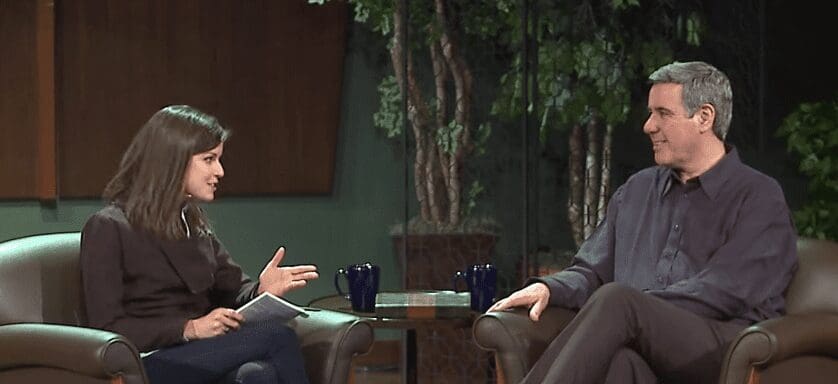What if you woke up one morning knowing it was your last day on earth? That’s what happened to the thief on the cross, who died a few feet from Jesus. Heaven, How I Got Here is his story, told in his own words, as he looks back from heaven on the day that changed his eternity. Author and pastor Colin Smith talks about the inspiration behind the book and why the message of salvation in Jesus is so important for people to hear.
Someone once said the thief on the cross had “breakfast with the devil and supper with the Savior.” What inspired you to write a book on the story of the thief on the cross?
To me, the story of the thief shows what Jesus Christ can do for a person more clearly and more directly than any other. Imagine this guy who begins the day knowing it’s going to be the most painful, dark, and hopeless day of his life. He awakens in absolute darkness, but he ends the day in the presence of Jesus Christ, who saves him as he puts his trust in Jesus while he’s actually on the cross. That transformation is absolutely remarkable.
I‘ve used this story many times to help people see who Jesus is and what he is able to do for them. If Jesus could save the thief a few hours before he died, there is hope in Jesus, even for a person at the end of his or her life. If Jesus could save the thief who clearly had not lived a moral life, there is hope in Jesus, even for the person who is far from God. The inspiration for this book is that there is hope for every person in Jesus Christ.
We only have a handful of the thief’s words recorded for us in the Bible. How were you able to write a whole book about him in the first person?
The “aha” moment came for me when I saw that Jesus died before the thief. We know this because John tells us that when the soldiers came to break the legs of the victims, Jesus was already dead. That means that the thief heard all the words spoken by Jesus from the cross. After putting his trust in Jesus, the thief heard the Savior cry out, “My God, my God, why have you forsaken me?” It isn’t hard to imagine how much that would have tested the thief’s new found faith. But then he witnessed the death of Jesus: his shout of triumph, “It is finished” and his self-giving into the hands of his Father. The real story here is the story of the sufferings and death of Jesus, and I have tried to tell it through the eyes and experience of the person who had the closest view of these events, and whose life was the first to be transformed by them.
In this book, the thief is presented as a skeptic. How does this story speak to the person who’s skeptical of Jesus today?
I think a lot of people are skeptical because they’re disappointed, and I certainly picture the thief in this way. I see him as someone who would’ve been disappointed in religion and moralism. He’s living in a brutal, oppressive, corrupt regime under the Roman rule that was over his nation, and nothing much is happening to change that. Everyone’s out to get you. That produces a kind of cynicism and skepticism for sure! When he’s on the cross, he does not think well of Jesus. We know this because at one stage both criminals are hurling abuse at him.
Yet something changed during these hours on the cross for this one thief: an awareness that he’s going to come into the presence of God, that eternity’s coming near to him, that he is a sinner. And he clearly was impressed with Jesus and with his character because he says to the other thief, “We are getting what we deserve, but this man has done nothing wrong.” Then he saw something about the power of Jesus: that Jesus can do something for him, that he can trust Jesus. “Jesus, remember me when you come into your kingdom,” he asks. Here’s a skeptic who actually finds someone he can trust! And trust in Jesus proves to be the very thing that changes the thief’s life.
How does this story comment on the value of religion and religious practices?
It really points out the limitations of religion. I assume the thief would’ve had a religious upbringing. But look at his position: He’s not lived a good life. Here he is at the end of his life, and there’s nothing he can do to improve it. A lot of people have the idea that we get into heaven by living a good life, a religious life. What’s the thief to do on that basis? He can’t do any good works; his hands are nailed to the cross. He can’t go and help somebody; his feet are nailed to the cross. What can he do? Religion cannot help him at that point in his life.
But Jesus can! This is the great importance of him turning to Jesus, a few feet away, and saying, “Jesus, would you remember me when you come into your kingdom?” And Jesus says to him, “Today you will be with me in paradise.” So Jesus is able to do for a person what religion can’t. He’s able to bring hope in a situation that would otherwise be utterly hopeless.
Heaven, How I Got Here is a short read. Seems like the potential was there for you to develop it into a full-blown novel. Why didn’t you?
I’m not interested in writing a novel. Heaven How I Got Here was written to convey a message. Every person who has ever lived will personally experience either heaven or hell. Jesus Christ came to deliver people from hell and to bring them into heaven. He is ready, willing and able to do this for any person. I want to make that message as clear as possible.
The thief is a marvelous sample of what Christ is able to do. It is a story full of hope, especially for a person who is near to death or for someone who feels that they have resisted God for too long. Christ brought the thief into heaven, and you can ask him to do the same for you.
What do you hope readers will take away from this book?
My hope and prayer is that readers would discover who Jesus is, why he came into the world, what he accomplished when he died on the cross, and how he is the Lord and Savior who lays claim to our lives on earth and opens heaven for all who come to him in faith and repentance.



